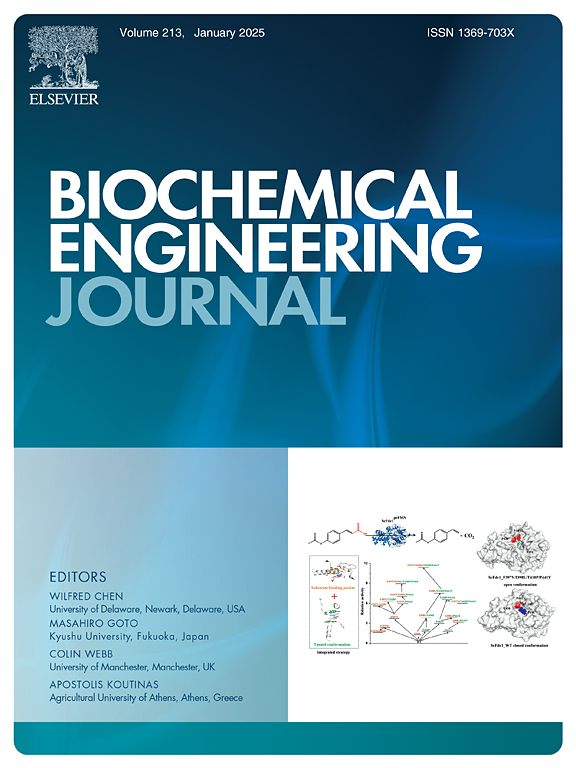On a new approach to describing soft pellets of filamentous cultivated in shake flasks under turbulent flow conditions
IF 3.7
3区 生物学
Q2 BIOTECHNOLOGY & APPLIED MICROBIOLOGY
引用次数: 0
Abstract
When cultivating filamentous pellets, the mechanical behaviour during cultivation is of particular interest for high process productivity under turbulent hydrodynamic flow conditions. However, the exact mechanical interactions between the pellets or between the pellets and the reactor walls are still not fully understood and can hardly be resolved using experimental methods. This study therefore presents a combined numerical approach to investigating the mechanical behaviour of soft biological pellets in highly turbulent flows. Unlike conventional models, which focus on rigid particles, this approach captures the complex interactions between culture fluid and pellet, pellet and pellet, and pellet and reactor wall. The developed model efficiently calculates the conditions in shake flask cultivations while providing a realistic representation of them by modelling the motion of particles on a large scale and capturing the free surface. By incorporating turbulence-induced mechanical effects, the model sheds light on the impact of fluid and contact forces on changes in pellet morphology. These findings contribute to the optimisation of large-scale biotechnological processes, increasing productivity and operating efficiency in microbial cultivation systems.
一种描述湍流条件下摇瓶培养的丝状微球的新方法
当培养丝状颗粒时,在湍流流体动力流动条件下,培养过程中的机械行为对高工艺生产率特别感兴趣。然而,球团之间或球团与反应器壁之间的确切力学相互作用仍然不完全清楚,很难用实验方法解决。因此,本研究提出了一种综合数值方法来研究软生物颗粒在高湍流中的力学行为。与专注于刚性颗粒的传统模型不同,该方法捕获了培养液与颗粒、颗粒与颗粒以及颗粒与反应器壁之间复杂的相互作用。所开发的模型有效地计算了摇瓶培养的条件,同时通过在大尺度上模拟粒子的运动和捕获自由表面来提供它们的现实表现。通过纳入湍流引起的机械效应,该模型揭示了流体和接触力对颗粒形态变化的影响。这些发现有助于大规模生物技术过程的优化,提高微生物培养系统的生产力和操作效率。
本文章由计算机程序翻译,如有差异,请以英文原文为准。
求助全文
约1分钟内获得全文
求助全文
来源期刊

Biochemical Engineering Journal
工程技术-工程:化工
CiteScore
7.10
自引率
5.10%
发文量
380
审稿时长
34 days
期刊介绍:
The Biochemical Engineering Journal aims to promote progress in the crucial chemical engineering aspects of the development of biological processes associated with everything from raw materials preparation to product recovery relevant to industries as diverse as medical/healthcare, industrial biotechnology, and environmental biotechnology.
The Journal welcomes full length original research papers, short communications, and review papers* in the following research fields:
Biocatalysis (enzyme or microbial) and biotransformations, including immobilized biocatalyst preparation and kinetics
Biosensors and Biodevices including biofabrication and novel fuel cell development
Bioseparations including scale-up and protein refolding/renaturation
Environmental Bioengineering including bioconversion, bioremediation, and microbial fuel cells
Bioreactor Systems including characterization, optimization and scale-up
Bioresources and Biorefinery Engineering including biomass conversion, biofuels, bioenergy, and optimization
Industrial Biotechnology including specialty chemicals, platform chemicals and neutraceuticals
Biomaterials and Tissue Engineering including bioartificial organs, cell encapsulation, and controlled release
Cell Culture Engineering (plant, animal or insect cells) including viral vectors, monoclonal antibodies, recombinant proteins, vaccines, and secondary metabolites
Cell Therapies and Stem Cells including pluripotent, mesenchymal and hematopoietic stem cells; immunotherapies; tissue-specific differentiation; and cryopreservation
Metabolic Engineering, Systems and Synthetic Biology including OMICS, bioinformatics, in silico biology, and metabolic flux analysis
Protein Engineering including enzyme engineering and directed evolution.
 求助内容:
求助内容: 应助结果提醒方式:
应助结果提醒方式:


